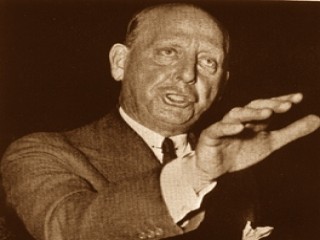
Frank Hague biography
Date of birth : 1876-01-17
Date of death : 1956-01-01
Birthplace : Jersey City, N.J.
Nationality : American
Category : Politics
Last modified : 2011-04-27
Credited as : Politician, mayor of Jersey City,
The American political leader Frank Hague, mayor of Jersey City, N.J., for three decades, was one of the major city bosses in the 20th century.
Frank Hague was born on Jan. 17, 1876, in Jersey City, N.J. At 16, after little schooling, he went to work. In 1896 he was picked by one of the Democratic district leaders to run for constable, given $80, and told to "use your head." Young Hague was elected and began his lengthy career in municipal politics.
Following his stint as constable, Hague held various other local offices. During those years he started to build his Democratic machine (an organization controlling politicians, patronage, and votes), which would later make him the most powerful man in the state. In 1917 he was elected mayor of Jersey City and went on to serve eight terms in office.
Hague's influence soon spread beyond the city. He controlled patronage in New Jersey and often had close ties with the state government. By 1922 he was elected a Democratic national committeeman and was a major figure in the party during the next 2 decades.
Hague's mayoralty brought much criticism, although by dispensing favors and courting the voters he remained enormously popular with his constituents. He kept a firm grip on his organization, and few doubted his words, uttered in a 1937 address, that "I am the law in Jersey City." David Dayton McKean alleged in The Boss (1940) that Hague stayed in power by methods that included controlling newspapers, intimidating opponents, engaging in wiretapping, and making false arrests to silence his critics.
As mayor, Hague built a $1.8 million maternity hospital and the Jersey City Medical Center, which cost $16 million. The medical center was the largest hospital in any city of comparable size and provided treatment at nominal fees. At the same time, however, Jersey City was the highest-taxed American municipality and had the biggest bonded debt of any large city in the United States.
Deciding not to seek another term as mayor in 1947, Hague picked his nephew to succeed him. Although the nephew won, he was defeated 2 years later. Hague suffered another blow in 1952, when the New Jersey State Democratic Organization refused to retain him as a Democratic national committeeman.
After Hague left office, his nephew and a former deputy mayor were named defendants in a $15 million suit brought by the city administration on behalf of city employees who allegedly had been required to kick back 3 percent of their annual salaries to the Hague machine during the 1917-1949 period. Hague sought to block the action, and the suit ultimately was dismissed. He died in New York on Jan. 1, 1956.
















